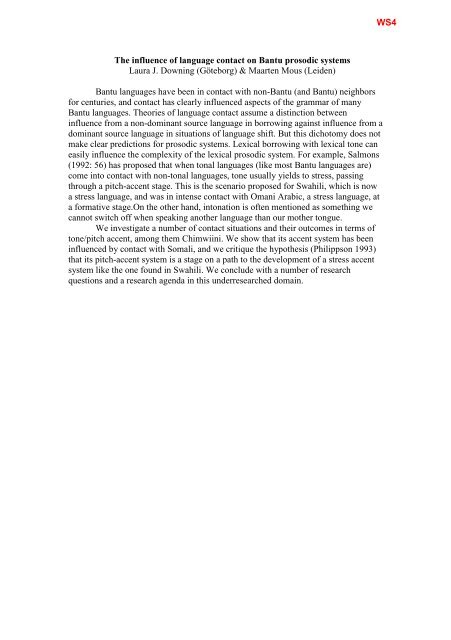here - 5th International Conference on Bantu Languages
here - 5th International Conference on Bantu Languages
here - 5th International Conference on Bantu Languages
You also want an ePaper? Increase the reach of your titles
YUMPU automatically turns print PDFs into web optimized ePapers that Google loves.
The influence of language c<strong>on</strong>tact <strong>on</strong> <strong>Bantu</strong> prosodic systems<br />
Laura J. Downing (Göteborg) & Maarten Mous (Leiden)<br />
<strong>Bantu</strong> languages have been in c<strong>on</strong>tact with n<strong>on</strong>-<strong>Bantu</strong> (and <strong>Bantu</strong>) neighbors<br />
for centuries, and c<strong>on</strong>tact has clearly influenced aspects of the grammar of many<br />
<strong>Bantu</strong> languages. Theories of language c<strong>on</strong>tact assume a distincti<strong>on</strong> between<br />
influence from a n<strong>on</strong>-dominant source language in borrowing against influence from a<br />
dominant source language in situati<strong>on</strong>s of language shift. But this dichotomy does not<br />
make clear predicti<strong>on</strong>s for prosodic systems. Lexical borrowing with lexical t<strong>on</strong>e can<br />
easily influence the complexity of the lexical prosodic system. For example, Salm<strong>on</strong>s<br />
(1992: 56) has proposed that when t<strong>on</strong>al languages (like most <strong>Bantu</strong> languages are)<br />
come into c<strong>on</strong>tact with n<strong>on</strong>-t<strong>on</strong>al languages, t<strong>on</strong>e usually yields to stress, passing<br />
through a pitch-accent stage. This is the scenario proposed for Swahili, which is now<br />
a stress language, and was in intense c<strong>on</strong>tact with Omani Arabic, a stress language, at<br />
a formative stage.On the other hand, int<strong>on</strong>ati<strong>on</strong> is often menti<strong>on</strong>ed as something we<br />
cannot switch off when speaking another language than our mother t<strong>on</strong>gue.<br />
We investigate a number of c<strong>on</strong>tact situati<strong>on</strong>s and their outcomes in terms of<br />
t<strong>on</strong>e/pitch accent, am<strong>on</strong>g them Chimwiini. We show that its accent system has been<br />
influenced by c<strong>on</strong>tact with Somali, and we critique the hypothesis (Philipps<strong>on</strong> 1993)<br />
that its pitch-accent system is a stage <strong>on</strong> a path to the development of a stress accent<br />
system like the <strong>on</strong>e found in Swahili. We c<strong>on</strong>clude with a number of research<br />
questi<strong>on</strong>s and a research agenda in this underresearched domain.<br />
WS4


